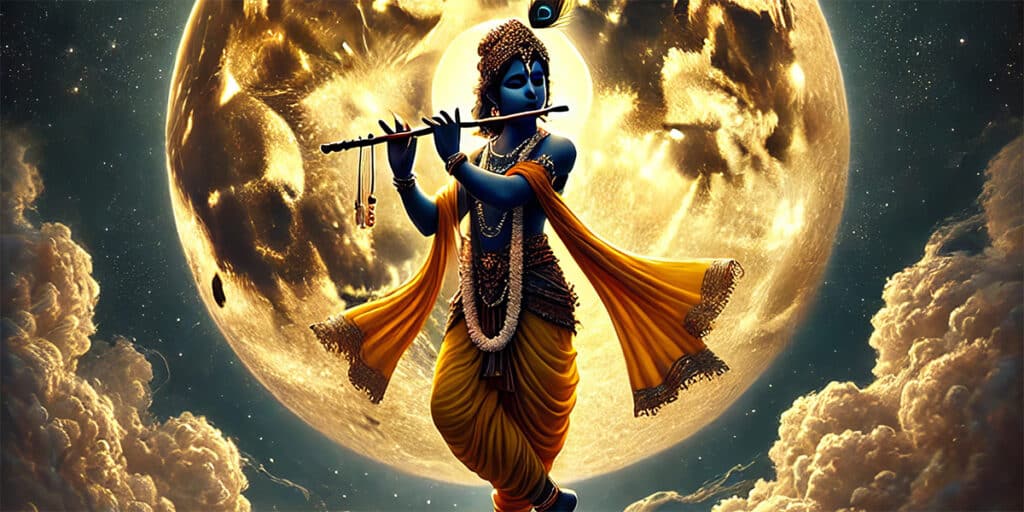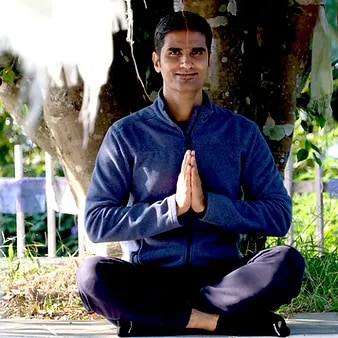Janmashtami & Yoga: Uniting Spirit, Mind, Body, and Soul
by Hardik Mehta

Janmashtami, the joyous celebration of Lord Krishna’s birth, is one of the most spiritually uplifting festivals in India. Beyond the traditional festivities of midnight prayers, devotional songs, and Dahi Handi, Janmashtami carries a profound connection to the ancient science of Yoga.
Lord Krishna’s teachings, especially those in the Bhagavad Gita, are deeply rooted in yogic philosophy. They guide us towards self-realization, inner peace, and purposeful living. Whether you are a seasoned practitioner or new to yoga, Janmashtami is a perfect time to explore the union between these two spiritual forces — the festival of Krishna and the practice of yoga.
In this blog, we’ll uncover the beautiful ways Janmashtami and yoga intertwine, and how you can use both to deepen your spiritual journey.
The Yogic Essence of Janmashtami
Krishna is revered as Yogeshwara, the ultimate master of yoga and the embodiment of supreme spiritual wisdom. In the Bhagavad Gita, he imparts timeless wisdom to Arjuna on the battlefield of Kurukshetra, which is symbolic of the inner battle each of us faces in life. His teachings are essentially a complete guide to yoga in its various forms — Bhakti Yoga, Karma Yoga, Jnana Yoga, and Dhyana Yoga.
Here’s how these connect to Janmashtami:
- Bhakti Yoga (Path of Devotion)
Janmashtami is steeped in devotion — singing bhajans, chanting mantras, and remembering Krishna’s divine playfulness. Practicing Bhakti Yoga on this day allows you to channel your emotions into love for the Divine, helping dissolve ego and cultivate a heart full of gratitude. - Karma Yoga (Path of Selfless Action)
Just as Krishna advised Arjuna to act without attachment to the results, Janmashtami inspires us to serve others without expecting rewards. Offering selfless service through acts like assisting with temple arrangements, sharing meals with the underprivileged, or engaging in charitable activities is a meaningful way to embody the principles of Karma Yoga during Janmashtami. - Jnana Yoga (Path of Knowledge)
Reading or reflecting on the Bhagavad Gita during Janmashtami can deepen your understanding of life’s higher purpose. This aligns perfectly with Jnana Yoga, which emphasizes self-inquiry and wisdom. - Dhyana Yoga (Path of Meditation)
The serene energy of Janmashtami is ideal for meditation. Chanting Krishna’s name as a mantra or visualizing his form in deep meditation brings mental clarity and emotional balance.
Yoga Practices to Try on Janmashtami
If you wish to honour Janmashtami through yoga, here are some practices you can include in your day:
- Early Morning Meditation
Begin your day with silent meditation, focusing on the Om Namo Bhagavate Vasudevaya mantra. This creates a devotional and peaceful mindset for the entire day. - Asana Flow for Inner Harmony
A gentle yoga sequence with heart-opening poses such as Ustrasana (Camel Pose), Anahatasana (Melting Heart Pose), and Setu Bandhasana (Bridge Pose) helps open the heart chakra — the seat of love and devotion. - Pranayama for Mental Calmness
Practice Anulom Vilom (Alternate Nostril Breathing) or Bhramari (Humming Bee Breath) to balance emotions and calm the mind before participating in festivities. - Kirtan and Chanting as Yoga
Singing Krishna bhajans and performing kirtan is an uplifting form of Bhakti Yoga. It uplifts your energy frequency and gently melts away stress and tension.
Bhagavad Gita Lessons for Yogic Living
The Bhagavad Gita is a spiritual treasure that unites Janmashtami and yoga. Krishna’s teachings offer practical tools for modern living:
- Equanimity in Success and Failure — A true yogi stays balanced no matter the outcome, just as Krishna advised Arjuna.
- Detachment from Ego — Surrendering the ego and aligning with a higher purpose is key to spiritual growth.
- Self-Discipline — Yoga isn’t just physical exercise; it’s about cultivating discipline in thoughts, actions, and emotions.
- Surrender to the Divine — Letting go of control and trusting the universe is a core message of both Janmashtami and yoga.
Fasting and Yoga: Purification of Body and Mind
On Janmashtami, many devotees observe fasting as a form of discipline and devotion. From a yogic perspective, fasting (Upavasa) is a cleansing process that purifies not just the body but also the mind.
Tips for Combining Fasting with Yoga:
- Practice gentle asanas to keep the body active but not overexerted.
- Hydrate with herbal teas or infused water if your fasting rules allow.
- Use meditation to divert focus from hunger to inner stillness.
Why Janmashtami is a Perfect Time for Self-Reflection
Janmashtami is more than a celebration — it’s a spiritual checkpoint. Just as Krishna guided Arjuna through confusion, we can use this day to reflect on our life’s direction. Through yoga, you can:
- Reconnect with your higher self.
- Set new intentions rooted in compassion and purpose.
- Strengthen your connection to divine wisdom.
Yoga for the Modern Seeker Inspired by Krishna
Amid the fast-paced demands of modern life, staying connected to one’s spiritual essence can easily slip away. Janmashtami reminds us of the joy of living with balance, love, and awareness — the very essence of yoga.
Integrating yoga into your life through Krishna’s wisdom allows you to embody his teachings in every breath and movement. It helps to:
- Reduce stress and anxiety.
- Cultivate emotional intelligence.
- Develop spiritual strength to face life’s challenges.
Remember, Krishna didn’t just preach yoga — he lived it. Krishna’s life harmoniously united joy and wisdom, dynamic action and serene stillness, active participation in the world and a deep sense of spiritual freedom.
Uniting Janmashtami and Yoga
Janmashtami and yoga are two sides of the same coin — both invite us to transcend the limitations of the material world and align with our true nature. On this sacred day, you can honour Krishna not just with rituals, but by embodying his teachings through your yogic practice.
Whether it’s through asanas, meditation, chanting, or acts of service, use this Janmashtami as an opportunity to deepen your spiritual journey. Let yoga be your offering to Krishna — a path of devotion, discipline, and self-realisation.
About Sayujya Yoga
Located in the heart of Mumbai, Sayujya Yoga is recognised as one of the premier yoga schools in India, offering traditional yoga teachings combined with modern practices. With the best yoga teachers and a highly reputed 200-hour Teacher Training Course (TTC), it’s the perfect place to begin or advance your yoga journey in Mumbai.
About the Author

Hardik Mehta
Hardik is an E-RYT 500 & YACEP (Yoga Alliance Continuing Education Provider), Yoga Alliance, USA. He has been practicing yoga for the last 9 years. Prior to finding his true calling in Yoga, he was working with various corporates for 12 years in the Retail and eCommerce sector.
